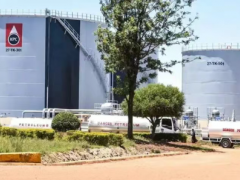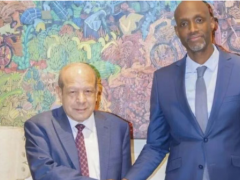According to the Nigerian National News, at the beginning of the 21st century, from October 10th to 12th, 2000, after preliminary consultations, the first Ministerial Conference of the Forum on China Africa Cooperation (FOCAC) was held in Beijing. Nearly a hundred ministers from China and 44 African countries attended the meeting, and the joint statement issued at the end of the meeting clearly stated: "Both sides highly appreciate the stable development of China Africa relations over the past few decades, are full of confidence in future cooperation, and unanimously believe that the traditional friendship between China and Africa has a long history, and friendly cooperation has a solid foundation
25 years have passed, and the development trajectory of China Africa cooperation fully confirms the optimistic expectation of "full confidence in future cooperation" at the first conference, and also strengthens the consensus that "friendly cooperation has a solid foundation" - this foundation is carefully nurtured by the "long-standing traditional friendship" between China and Africa.
History as the foundation: China Africa friendship has long had a profound accumulation
In fact, before the establishment of the Forum on China Africa Cooperation, China Africa cooperation had already written a brilliant chapter. In 1967, China launched the construction project of the Tanzania Zambia Railway, a nearly 2000 kilometer railway connecting Zambia and Tanzania. China provided interest free loans to cover the construction costs, as well as supporting infrastructure such as stations and training schools, and supplied locomotives and rolling stock. According to the agreement, this interest free loan will be repaid over 30 years.
At that time, major Western countries and even the former Soviet Union firmly rejected this project, which later became known as the "Road to Freedom," citing "economic impossibility. And China not only took on the heavy responsibility, but also completed the Tanzania Zambia Railway as scheduled in 1974, laying a crucial foundation for the connectivity of the African continent.
In 1971, at the United Nations General Assembly, 26 African countries, including Nigeria, together with 76 other countries, voted to support China's restoration of its lawful seat in the United Nations, laying the foundation for the international consensus that "there is only one China in the world, and Taiwan is an inalienable part of China's territory".
It is precisely such close exchanges and mutual support that have built the "long-standing traditional friendship" between China and Africa, and have also become the "solid foundation" for the establishment of the Forum on China Africa Cooperation. It needs to be clarified that even though China Africa cooperation has achieved leapfrog development since the establishment of the Forum on China Africa Cooperation in the 21st century, this relationship is not a "new thing", nor is it the "transactional relationship" that some commentators call it - it is rooted in the spirit of traditional friendship and unity, stemming from the history of colonial rule and imperialist exploitation experienced by both sides, and carrying the common aspirations of the two peoples for social progress and economic prosperity.
Remarkable achievements: dual wheel drive of infrastructure and economic and trade cooperation
From the infrastructure support launched by the Tazara Railway to the deepening and expansion under the framework of the Forum on China Africa Cooperation and the "the Belt and Road" international cooperation, China has helped Africa build and renovate more than 10000 kilometers of railways, about 100000 kilometers of roads, more than 1000 bridges and nearly 100 ports.
Among them, there are also iconic cross-border projects: the Ethiopia Djibouti cross-border electrified railway has a total length of over 750 kilometers, greatly reducing the travel time and cost between Ethiopia's industrial core area and Djibouti ports; The Mombasa Nairobi standard gauge railway in Kenya has become the backbone of regional transportation; The Lagos Laki Deepwater Port in Nigeria is expected to bring about $360 billion in economic benefits and create 170000 job opportunities.
These projects are responding to the long-standing expectations of the African continent. As early as 1980, when the dissolved Organization of African Unity (OBU) held a special meeting in Lagos, it listed "solving the infrastructure shortage problem in the pan African unification process" as an important issue. The vision of "achieving continental connectivity and promoting industrialization" in the Lagos Action Plan was hindered by opposition from the World Bank and insufficient political will. Now, with the help of the Forum on China Africa Cooperation, this blueprint has been re implemented, and "Africa in the post colonial era is achieving internal linkage through interconnectivity and trade with unprecedented strength.
Economic and trade cooperation has become the flagship area of engagement between China and Africa. China has maintained its position as Africa's largest trading partner for 16 consecutive years, with bilateral trade reaching $295.74 billion in 2024, a year-on-year increase of 6.1%. Since the establishment of the Forum on China Africa Cooperation in 2000, the average annual growth rate of China Africa trade has been 14.2%, rising from an initial 13.94 billion US dollars to the current historical high.
More noteworthy is the optimization of trade structure: the previous model of "exporting energy and minerals from Africa and manufactured goods from China" is gradually shifting towards high value-added fields. In 2024, Africa's exports of processed agricultural products to China will significantly increase, demonstrating its strength in agricultural product processing and manufacturing; China's exports of photovoltaic modules, industrial robots, smartphones and other products to Africa have also provided technological support for the upgrading of African industries.
At the same time, China continues to increase its investment in Africa, with a cumulative investment of 42.12 billion US dollars in manufacturing, agricultural product processing, energy, digital economy and other fields. Nearly 3300 Chinese companies are operating in 51 countries in Africa. To help African products better enter the Chinese market, China has set up the China Africa Economic and Trade Expo - the fourth expo in 2025 signed 176 projects with a total amount of 11.39 billion US dollars, an increase of 45.8% compared to 2023.
In June 2025, in order to implement the plan, China announced that it would grant 100% tariff free treatment to 53 African countries that have established diplomatic relations with China for their export products, further opening the door to the Chinese market for African products.
Promising Future: Building a Community with a Shared Future for China and Africa in the New Era
Over the past 25 years, the Forum on China Africa Cooperation has pushed bilateral cooperation into a new stage of "rapid, comprehensive, and stable development" - not only establishing diverse cooperation mechanisms and trade facilitation measures, but also providing long-term institutional guarantees for China Africa relations.
China Africa cooperation has always been known for its tangible and practical results. At the same time, both sides also cultivate common values through experience sharing and governance exchanges. Nowadays, with the help of the Forum on China Africa Cooperation, political party consultations and cultural dialogues are constantly deepening, and the barriers caused by geographical distance are gradually being eliminated.
Despite many milestone achievements, the "China Africa Journey" under the framework of the Forum on China Africa Cooperation is still ongoing.
Looking back more than 60 years ago, Chinese Premier Zhou Enlai proposed the Eight Principles of China's Aid to Africa during his visit to Ghana. The fourth principle clearly states: "The purpose of the Chinese government's aid to Africa is not to make recipient countries dependent on China, but to help them gradually embark on the path of self-reliance and independent economic development." More than 60 years later, this concept still holds true.
For Africa, a historic opportunity has arrived - responding to China's "brotherly friendship" with an open attitude and leveraging the joint planning of the Forum on China Africa Cooperation to effectively transform China's opportunities into the driving force of Africa's rejuvenation is an important mission at present.








